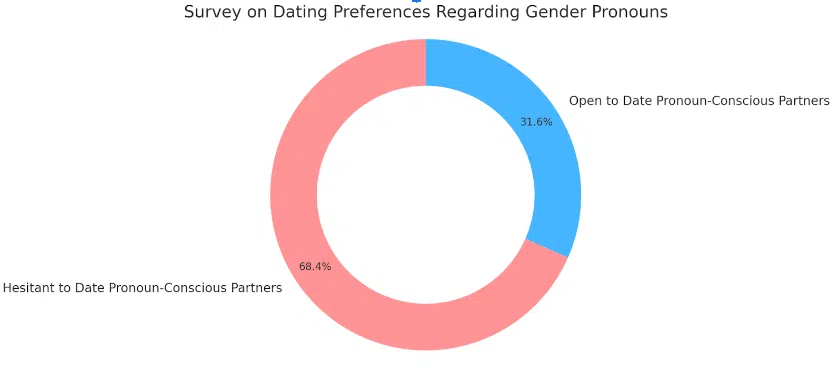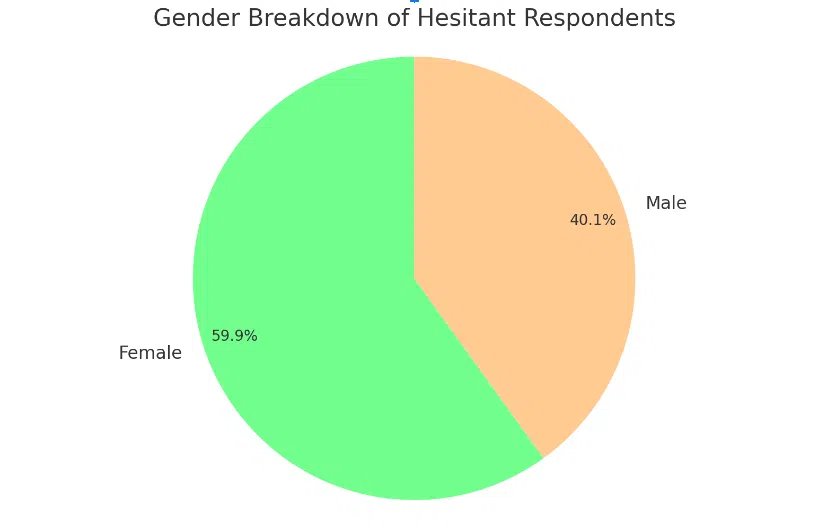Blog » Becoming a Coach » 3 in 5 Say No to Dating Pronoun-Conscious Partners
3 in 5 Say No to Dating Pronoun-Conscious Partners
In a revealing survey conducted by the Coach Foundation, an intriguing trend emerged concerning modern dating preferences. This survey aimed to explore how attitudes towards gender pronouns and identity play a role in shaping romantic interests and choices in today’s world.

Participants from first-world countries, mainly America, Australia, and the U.K., were asked whether they would date people who were focused on gender pronouns and identity. The survey revealed the multifaceted nature of identity politics entering the dating world today.
Survey Findings: A Detailed Overview
- Key Statistic: The survey found that a significant 68.4% of respondents (684 out of 1000) are hesitant or unwilling to date people who are heavily focused on gender pronouns and identity.

- Gender Breakdown: Among these 684 people, 410 are female and 274 are male. This gender distribution offers an interesting perspective on how different genders might view the importance of gender pronouns and identity in a potential partner.

Analyzing the Data: What Does It Tell Us?
- A substantial proportion of the surveyed population, almost 3 in 5 participants, prefers not to engage romantically with people who place a significant emphasis on gender pronouns and identity. This inclination points towards a trend where personal connection and other traits may be prioritized over discussions about identity and pronouns in the dating scene.
- The higher number of females expressing this preference raises questions about societal influences and gender-specific expectations in the context of dating and romantic relationships.
- It’s important to acknowledge that a significant minority (31.6%) did not share this view, highlighting the diversity of opinions and preferences in the modern dating landscape.
The Rise of Gender Pronoun Consciousness
The growing recognition of non-binary and transgender people has led to a broader conversation about gender identity and pronouns. Many people now actively share their preferred pronouns, emphasizing respect for individual identity. This increased awareness aims to foster inclusivity and understanding, breaking down traditional gender binaries.
However, this heightened focus on gender pronouns and identity has also sparked diverse reactions. For some, the emphasis on correctly using gender pronouns is seen as a critical step towards inclusivity and respect for personal identity. Others, however, find the constant focus on pronouns and the complexities surrounding them to be challenging or frustrating, particularly in social settings like dating.
According to the survey results, a notable 68.4% of the participants (684 out of 1000) expressed hesitancy or reluctance when it comes to dating people who place a strong emphasis on gender pronouns and identity. Among these 684 respondents, there were 410 females and 274 males. This gender breakdown provides valuable insights into how various genders perceive the significance of gender pronouns and identity when considering potential romantic partners.
Sex is Biological, Gender is a Construct: The Debate
The age-old debate that ‘sex is biological, while gender is a construct’ gains new relevance in light of a recent survey on modern dating preferences. This survey, which found that 3 in 5 people are hesitant to date people who are highly conscious of gender pronouns, brings to the forefront the complex interplay between biological sex, gender identity, and romantic relationships.
Biologically, sex is determined by the genetic and physiological characteristics that define men and women. However, gender is more about the roles, behaviors, activities, and attributes that a given society considers appropriate for men and women. This distinction is crucial to understanding the survey’s findings. It suggests that while biological sex is a fixed aspect of an individual’s identity, gender—and the importance placed on it—is more fluid and varies greatly among people.
This fluidity of gender as a social construct can often lead to differences in how people perceive and engage with potential romantic partners. The survey indicates that a significant number of people prefer not to navigate the complexities of gender identity in the early stages of dating. They may find the focus on gender pronouns and the broader discourse around gender identity to be overwhelming or unnecessary for establishing a romantic connection.
Additionally, the survey highlights a potential generational or cultural shift. Younger generations, who are typically more exposed to and accepting of the concept of gender fluidity, might still be navigating how to balance these views with their personal preferences in dating.
Conclusion
The findings of this survey offer a fascinating glimpse into the modern dating landscape, particularly in the context of the rising sensitivity towards gender pronouns and identity. It’s clear that as society becomes more attuned to issues of gender identity and expression, these factors are increasingly influencing personal relationships, including how people choose their romantic partners.
This survey underscores a nuanced reality: while a significant portion of people prefer to steer clear of heavily pronoun-focused relationships, there is also a considerable segment that does not share this sentiment. This divergence in preferences speaks to the complexity of human relationships in our current social climate. It suggests that while some people may find the emphasis on gender pronouns important and a sign of respect and inclusivity, others might view it as an added complication or unnecessary focus in the early stages of a romantic connection.
Methodology
The survey involved a diverse group of 1,000 people, capturing a range of opinions and backgrounds. The aim was to obtain a comprehensive understanding of current dating preferences and attitudes towards the increasing awareness of gender pronouns and identity in romantic relationships.

ABOUT SAI BLACKBYRN
I’m Sai Blackbyrn, better known as “The Coach’s Mentor.” I help Coaches like you establish their business online. My system is simple: close more clients at higher fees. You can take advantage of technology, and use it as a catalyst to grow your coaching business in a matter of weeks; not months, not years. It’s easier than you think.
AS SEEN ON
0 Comment